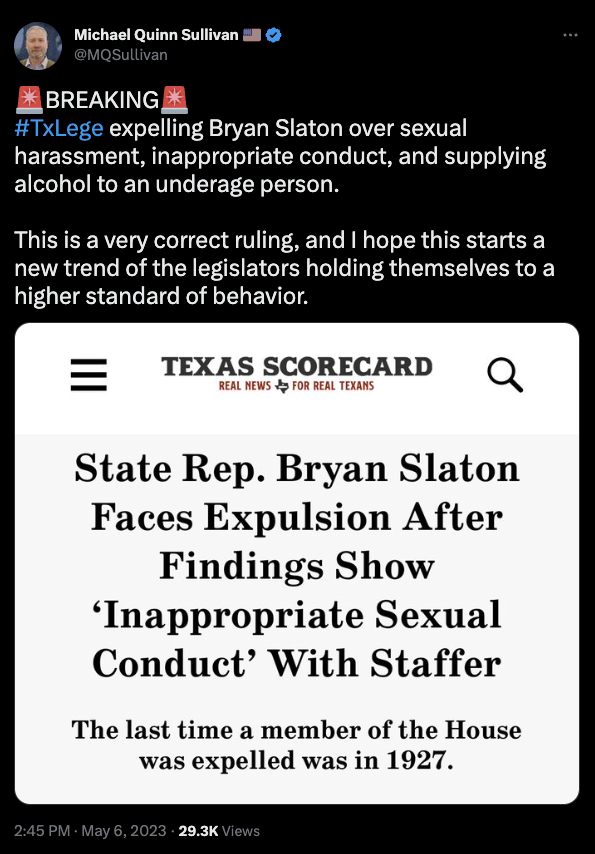Deceptive Criticism: Ken Paxton's Impeachment Illusions
Did the process move too slow or too fast? Texas Scorecard's axis of allies: "Yes."

Tony Buzbee is going with "The Enterprise defense" for Paxton's trial in the Texas Senate.
In recent weeks, the Texas Scorecard's axis of allies, funded by The Enterprise, have launched a vehement criticism of the impeachment process undertaken against Ken Paxton, labeling it as flawed and illegal. Does their criticism stem from genuine concerns or is it simply a calculated manipulation, driven by prioritizing the protection of their investments into elected officials over the truth?
By examining their track record and assessing the evidence, we aim to uncover the true intentions behind their criticisms and shed light on the underlying agenda at play.
The Slaton Expulsion
To shed light on the matter at hand, let us delve into the investigation of Bryan Slaton, which serves as a crucial precedent. As numerous articles by Scorecard Confessions have revealed, The Enterprise plotted to exploit the situation and manipulate their audience's perception, just as they are doing now with Ken Paxton.
READ: Bryan Slaton thought he could survive
READ: Bryan Slaton's Airbnb Meeting
The investigation into the former Representative was initiated following the filing of an initial complaint on April 5th. The General Investigation Committee conducted its proceedings, gathered evidence and took testimonies. Importantly, the committee had no prior evidence on Representative Slaton before the whistleblower complaint was filed.
Remarkably, within a mere 35 days, from April 5th to May 9th, the General Investigation Committee progressed from having no information about Slaton to his expulsion. Notably, there were no calls to question witnesses before the entire House, nor were there complaints about rushing into expelling a member within a 48-hour timeframe. Michael Quinn Sullivan of Texas Scorecard even applauded the House's decision, deeming it the "very correct" choice after the 35-day investigation concluded.

The Enterprise's Defense of Paxton's Impeachment vs. Slaton's Expulsion
Now, let's turn our attention to the investigation of Ken Paxton. The General Investigation Committee initiated its inquiry into Paxton in February, following the announcement of the settlement on February 10th. In contrast to the Slaton investigation, the Paxton case had a wealth of evidence from federal cases, a whistleblower settlement, and other available documents and information prior to the committee's involvement. Therefore, the committee did not need to construct a case from scratch, as they did with Slaton.
The investigation into Paxton spanned approximately 104 days, from around February 10th until the General Investigation Committee recommended impeachment on May 25th. It raises a pertinent question: Are Representative Tinderholt, Representative Toth, and The Enterprise genuinely concerned about the process's length? Logically speaking, an investigation with pre-existing information should have taken less time than one like Slaton's, which necessitated building a case from the ground up. Hence, it becomes clear that their concerns primarily revolve around the perceived inefficiency of the impeachment process.
Considering Sullivan's assertion that a 35-day investigation was sufficient for the House to make a "very correct" decision, it becomes evident that the criticism from these individuals is fueled by their perception of a delay in impeaching Paxton, based on their own standards of efficiency. However, it is crucial to recognize their underlying motives and manipulative tactics. The Enterprise relied on one of their financed House representatives to raise issues that were previously absent from the discourse during Slaton's expulsion, creating an illusion of concern.
Their goal is to protect their vested financial interests in elected officials and maintain control over the narrative.
Tinderholt's Slip of the Tongue Exposes The Enterprise's True Doctrine
In a revealing moment, Tony Tinderholt inadvertently disclosed the fundamental doctrine that drives The Enterprise. It happened during his questioning of Chairman Murr, shedding light on the inner workings of this influential entity.
"I believe perception is truth to the person who perceives it. So, if someone perceives something, it's true to them, whether it's truth or not."
- Representative Tony Tinderholt
Thus, Tinderholt unveiled the disingenuous nature of The Enterprise's criticisms and unmasked their deceptive agenda. Only through a fair analysis can we determine the rationality of the criticism directed towards the General Investigating Committee and safeguard ourselves against their manipulative tactics. It is imperative to recognize that The Enterprise, driven by their vested interests, manipulates public opinion to serve their own agenda. They appear to exploit their financial influence over elected officials, relying on one of their financed House representatives to raise issues that were previously absent from the discourse during the proceedings to expel Bryan Slaton.
Their aim is to sow doubt, create confusion, and ultimately undermine the integrity of the impeachment process, as Scorecard Confessions has previously revealed.
Did Paxton's Impeachment Process Move Too Slow or Too Fast? "Yes."
As we critically examine the impeachment process and the role of The Enterprise, glaring and unyielding questions emerge: What exactly is their issue with the process? Are they arguing it moved too slow or too fast? The blatant inconsistency becomes strikingly apparent when we juxtapose their approval of Bryan Slaton's swift expulsion, accomplished in a mere 35 days, with their vehement disapproval of the 104-day investigation into Ken Paxton.
The Enterprise's bewildering and contradictory stance not only raises confusion but also casts a long shadow of doubt over their true motives. Can we genuinely believe they are concerned about the efficiency and fairness of the impeachment process? Or are their actions driven by concealed ulterior motives rooted in their financial investments into elected officials?
If The Enterprise is genuinely concerned about the fairness of the impeachment process in the Senate, isn't it peculiar that no one within their axis of allies have been found to raise any of these valid concerns? But alas, their silence speaks volumes.
